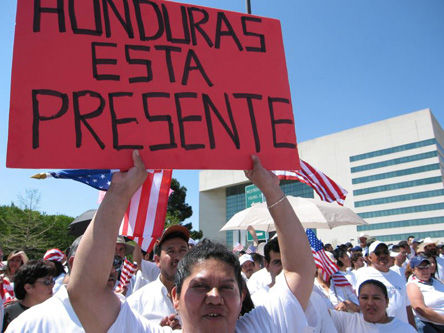
On January 27, the de facto executive of Honduras, Roberto Micheletti of the Liberal Party, will turn over power to the National Party’s Porfirio “Pepe” Lobo, victor in a questionable election last November 29. Lobo is hoping that this transition will legitimize his own rule and quiet the unrest that arose from the ouster of the legally elected president, Manuel “Mel” Zelaya last June 28, by a military coup.
Most of the countries in the region are refusing to recognize the results of the election, because it was carried out with the army in the streets suppressing Micheletti’s opponents and administered by the illegal, coup-installed regime. There is extreme anger at the Obama administration on the part of coup opponents, because, after having made statements against the coup and in support of Zelaya’s presidency, the U.S. State Department undercut the pressure being exercised on Micheletti to step down before elections, by announcing in advance that the United States would recognize the results anyway. A last minute deal negotiated by the State Department, which would have restored Zelaya in time for elections and set up a government of national unity for the period between the elections and the turnover of power on January 27, fell apart because the Honduran Congress refused to vote on the restoration of Zelaya until after the elections, and because Micheletti unilaterally appointed himself head of the so-called “unity” government.
The reaction to a desperate last minute effort by the U.S. State Department last week to restore the pre-election deal and have Micheletti step down and the unity government be set up for the two weeks remaining got nowhere, because Micheletti contemptuously rejected the idea of stepping down, and Zelaya did not lend his support either.
Lobo very much needs all doubts about the legitimacy of the election to be laid to rest. Not only do such doubts weaken his presidency in general, they threaten it with a continued denial of foreign aid and other support.
The Honduran Supreme Court has agreed with prosecutors that six top military leaders, including armed forces head General Romeo Vasquez Velasquez, should face trial for illegally removing Zelaya from the country during the June coup. But the charges relate only to the act of removing the president physically, not to having overthrown him in the first place. And, as Zelaya, still besieged in the Brazilian embassy in Honduras’ capital, Tegucigalpa, has pointed out, the “prosecution” of the generals is an obvious charade designed to get the civilian instigators of the coup off the hook.
The Congress is now also debating whether to extend a blanket amnesty to everybody who was involved in the coup, which presumably covers General Vasquez and his colleagues also.
In the streets, murders and disappearances of Honduran resistance figures continue. There is evidence of a return of old-style death squads, with scores of unsolved deaths occurring since the elections. A gay rights campaigner was murdered on December 16 (one of several such murders), a progressive radio station serving the Garifuna community (Afro-Hondurans who speak a Native American language) was burned down, and the son of an anti-coup radio commentator was reported kidnapped on January 10. On Friday January 8, there were injuries, deaths and arrests when the authorities forcibly removed 600 rural people who had moved into one of the big estates owned by a coup supporter. There have been fatalities on the pro-coup side also, which give Micheletti and friends the pretext to accuse the resistance of terrorism.
The resistance, grouped in the National Front Against the Coup in Honduras, has officially given up the effort to restore Zelaya to power, and is now concentrating on the fight for a new constitution that would give more direct power over policy to workers and peasants. Ironically, it was Zelaya’s support for the drive by unions and organizations to change the constitution that was used by the oligarchy and the military as a pretext for the coup. On Thursday January 7, 15,000 people marched in Tegucigalpa to protest the move by the Micheletti regime to withdraw Honduras from the Bolivarian Alliance for the People of Our America (ALBA), which Zelaya had joined (the other ALBA members are Cuba, Venezuela, Nicaragua, Ecuador, Bolivia, Antigua, Dominica and St.Vincent). The marchers understood that the net effect of withdrawing from ALBA, which is a left-leaning economic, trade and political bloc, would be to continue Honduras’ extreme dependence on the United States, while depriving this extremely poor country of economic help, including both favorable trade conditions and direct foreign aid from the other ALBA countries.
Photo: http://www.flickr.com/photos/cadelagarza/ / CC BY 2.0

MOST POPULAR TODAY

High Court essentially bans demonstrations, freedom of assembly in Deep South

U.S. imperialism’s ‘ironclad’ support for Israel increases fascist danger at home

UN warns that Israel is still blocking humanitarian aid to Gaza

Resource wars rage in eastern Congo, but U.S. capitalism only sees investment opportunity







Comments